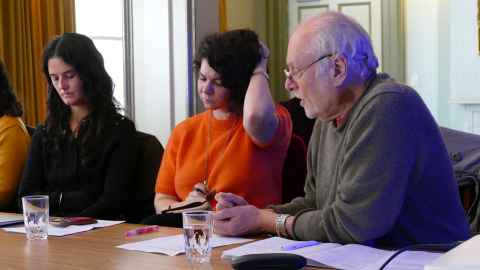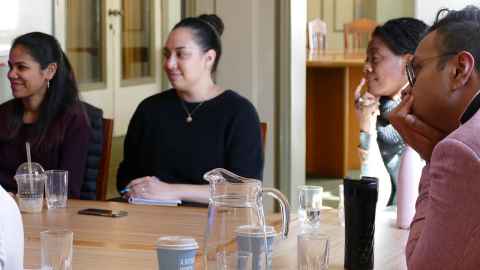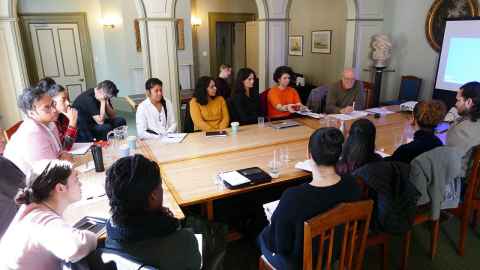Rare chance to learn from a master
11 September 2019
A recent masterclass with leading theorist Professor Walter Mignolo was an inspiring experience for postgraduate students in Art History and Fine Arts.

A visiting Faculty of Arts Hood Fellow from Duke University in the US, Professor Mignolo is a groundbreaking thinker and prolific author in the fields of modernity, coloniality and decolonial theory.
While in Auckland, he took a break in his public lecture schedule to conduct a small masterclass with students whose own shared focus on Indigenous ways of making, thinking about and displaying art connected deeply with his own.
The class began with the students briefly introducing their own research, which was a thought-provoking exercise, says Anisha Verghese, a PhD student in Art History.
"Doing a PhD can occasionally be a rather isolating experience. Notwithstanding the opportunities to learn about your colleagues' research, having an intimate space to share related areas of concern was a wonderful experience."
She says being able to engage with a theorist she uses in her own writing was the highlight of her academic experience up to now. "Professor Mignolo asked what appeared to be simple questions: 'Why are you doing what you are doing?' 'How do you know what you know?' and yet they produced the most profound internal monologues."
She particularly remembers him observing that "decolonial thinking – a term he uses to describe a way of rejecting dominant colonial perspectives that have caused so much division and harm to Indigenous societies in particular – is something of a philosophical exercise".
"He said that examining how coloniality touches each one of us could enable us to change the terms of the conversation and understand our own agency," says Anisha. And towards the end of the class, she was surprised that he talked about love.
"It's not often you hear of love in an academic space, but it was something that struck me as vital. Eurocentric perspectives are based on assumptions of cultural superiority and hierarchies of knowledge and power that marginalise, exclude and discriminate. I wondered, would this endure if we truly learnt to love and respect one another?"

PhD student Talei Si'ilata says one of the first things that struck her was hearing Professor Mignolo say that the students' research "should not be for academia, but for the purposes of liberation, and specifically the liberation of our communities".
"This is a truth that I know well, but hear acknowledged so little within academic institutions. What also spoke to me was his constant reminder of the need to shift our understandings of coloniality in a very personal way. He encouraged us to always question why we are doing what we are doing, as well as how we are being seen and who is identifying us; this being a characteristic of coloniality and its matrix of power."
She says she felt particularly validated in her own research by Professor Mignolo's willingness to engage with the class on both a theoretical and personal level.
"To truly engage in talanoa (a traditional word used in Fiji and across the Pacific to reflect a process of inclusive, participatory and transparent dialogue) with us, and because of his clear recognition of the long road we have ahead of us in the endeavour to decolonise our research process."

Walter Mignolo's visit was enabled by a partnership between Dr Caroline Vercoe in Art History and Gabriela Salgado, director of Te Tuhi Contemporary Art in Pakuranga. Dr Vercoe says they were particularly interested in bringing together researchers whose work engaged in Indigenous and decolonial concerns, but may not be so familiar with Walter Mignolo's work and thinking.
"We were already so inspired by the 'in conversation' public lecture between Walter and Professor Linda Tuhiwai Smith the night before, so it was a wonderful chance for our postgraduate students to present and discuss their research with Walter the next day," says Dr Vercoe.
Media contact
Julianne Evans | Media adviser
Mob: 027 562 5868
Email: julianne.evans@auckland.ac.nz